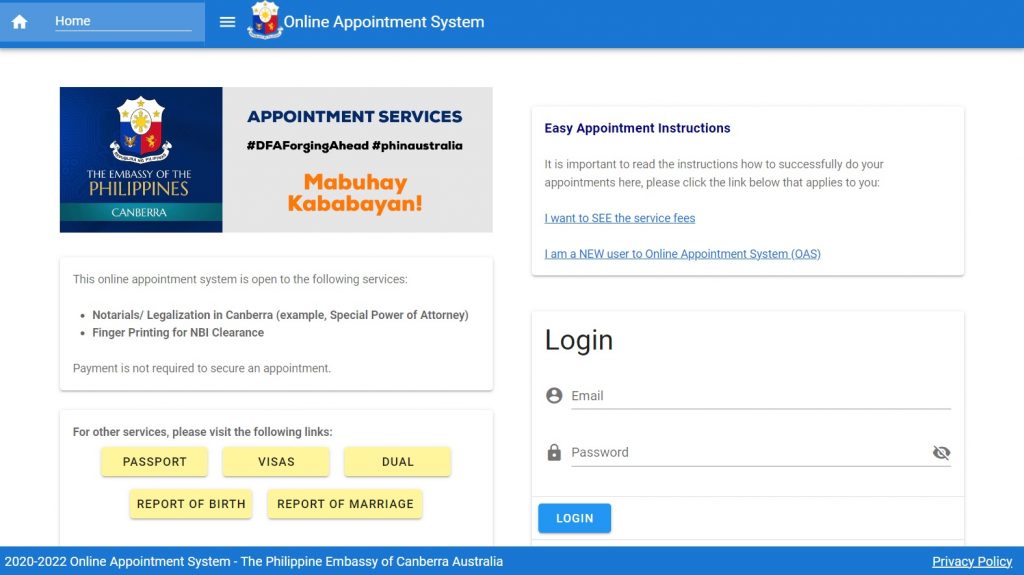Organization
Department of Foreign Affairs
Best Practice Focus Area/s
Citizens / Customers Measurement, Analysis and Knowledge Management Operations
Year Implemented
15 May 2020
This is a GBPR 2021 Recipient
Summary
The Integrated Online Consular Service System for Appointment Scheduling, Service Delivery Monitoring, and Client Data Analytics was designed by the Philippine Embassy in Canberra to be a client-focused digital platform that evolves the standard appointment system into a holistic system that covers end-to-end service monitoring and delivery, provides data analytics to help anticipate challenging situations and make data-based plans and improvements.
Background and Problem
The Philippine Embassy in Australia’s services is open to the over 300,000 Filipinos living in the seven states/territories of Australia, especially the 100,220 Filipinos residing in areas under the consular jurisdiction of the Embassy.
The Philippine Embassy had a walk-in policy for all services before this initiative. This became unsustainable because of long waiting times and crowding during peak days, the unpredictable number of services and service hours per day, and the rapid increase in the workload of frontline personnel who were also handling back-office operations and addressing public queries.
The previous processes rely heavily on the client (a) remembering and understanding the procedures for releasing their passport and (b) constantly checking the Embassy website or calling the Embassy for an update on their passport. Alongside this, the Embassy staff needs to manually retrieve the consular documents each time a client queries are received on the status of their application.
During disasters like the bushfire crisis in Australia and the current COVID-19 pandemic, basic statistics about Filipinos in the various states/territories of Australia can be crucial in planning courses of action and providing urgent advice in critical situations, if needed.

Solution and Impact
The system was activated on 15 October 2020, covering the first three consular services: passport, notarial, legalization, and NBI fingerprinting. A test model was developed per consular service. Both management and staff members individually tested the model. Further consultative meetings would be held with the developer for technical adjustments.
Alongside this, the Embassy conducted an information dissemination campaign to inform the public of the expected changes with a step-by-step guide on navigating the system.
The system unifies the management of consular services providing a more comprehensive overview of consular operations. From an organizational perspective, the system produces quantitative data sets on clients and services, which can form the basis for future operational improvements and support policy formulation by the mother agency, the Department of Foreign Affairs in Manila. Among others, the system generates the following data:
- Number and kinds of services availed per day, month, or year. The Embassy can determine if additional appointment slots or personnel are needed for particular periods or services at any given time;
- Disaggregated data on clients’ locations. As the Embassy’s clients can come from any of Australia’s seven states and territories, this feature allows the Embassy to prepare in advance if clients are coming from a state or area with active COVID-19 cases to provide additional care or consideration for clients coming from far away places The data will also be crucial during disasters and emergencies in a particular state in Australia.
- The system also allows supervisors to see the progress of a particular service’s completion and identify the stage and personnel where a backlog has occurred. It encourages accountability and provision of intervention or assistance on an objective basis.
- Gender-based data. In line with GAD, disaggregated data regarding PH-based gender is also available.
The consular services covered as of 07 July 2021 are:
- Passport applications;
- Notarial and legalization of documents;
- Fingerprinting for NBI clearance; and
- Overseas voter registration. Plans are ongoing to integrate dual citizenship and civil registry services within the month.
The system also provides flexibility and reliability in the work of the Embassy as any consular personnel can navigate the system. The system will also be particularly useful when the Embassy is forced to implement alternative work arrangements as contingency arises. For the part of the consular clients, it provides transparency and predictability in the availability and delivery of service. This transparency, alongside buy-in from the personnel, contributed to improved performance and customer service orientation of Embassy staff, as seen in the feedback forms and various forms of appreciation expressed by clients.
Finally, the system allows the Embassy to send updates to a specific group of clients when needed. As the COVID situation remains fluid, the Embassy can provide updated advice to affected clients on new regulations or restrictions and any delay in service delivery.
Milestones
In June 2021, this system was recognized by the Department of Foreign Affairs in Manila as among the DFA Best Practices for 2021 – Foreign Service Post Category as part of the DFA Quality Management Service performance. Among the immediate results was improved efficiency and productivity of personnel due to the significant decrease in the number of phone calls and emails inquiring about consular services under the system. The information on each transaction is sent to clients automatically as a matter of standard operating procedure. The auto-generated emails also provide detailed information for clients. Frontline staff has observed a higher compliance rate with the requirements reducing the back-and-forth communications between staff and clients. The time saved was used by personnel to answer phone calls and emails on other matters and to provide higher customer service quality to in-person clients.
The Embassy is continuously developing the system based on a regular review to ensure it continues to meet the client’s expectations and serves the effective delivery of consular services. At the same time, the Embassy also strives to develop this system into one that meets the modern standards of business service delivery. The future developments include (a) the inclusion of all consular services, (b) automation of more functions, (c) the option for updates via text, and (d) generating greater customer feedback.
